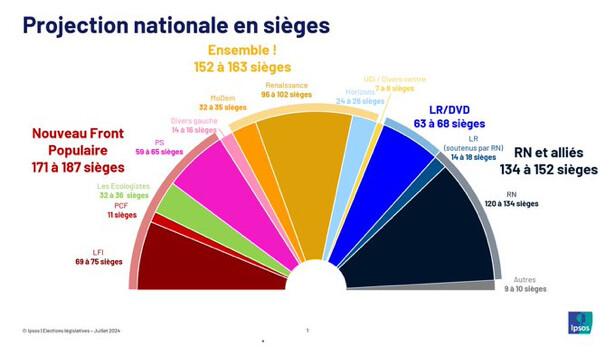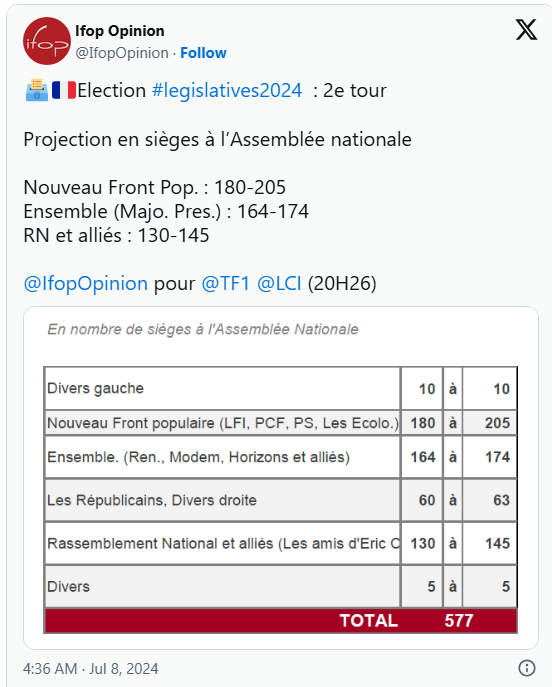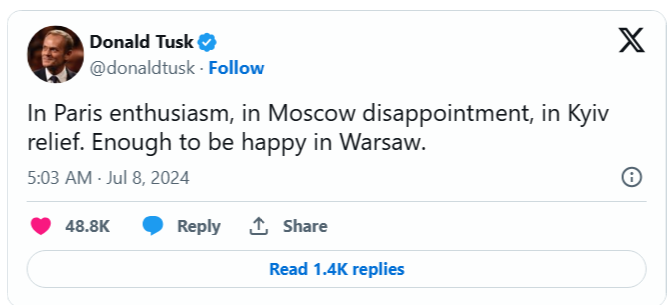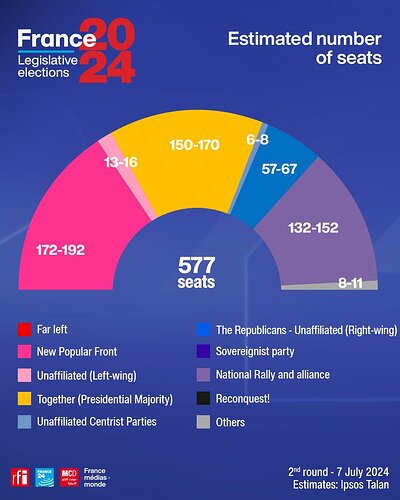Some candidates who have gone through to the second round have withdrawn to support better placed candidates who have more chance of winning in the second round. Main withdrawals have been by NFP (124) and the Macron Coalition (74).
I need Anthony Green to understand the French system (which seems in practice to have elements of preferential voting).
It’s a first past the post system. 1st round is pretty much a qualification round for the 2nd week of elections. Left wing parties are withdrawing their weakest candidates for the strongest left wing candidate to get all the left votes. Le Pen has little chance.
If the rules were like Britain where the winner is 1st past the post, she would be prime minister on last weeks results.
In Britain. If the Torries did the same as the left are in France, Reform would win and Farage would be prime minister on Friday.
Won’t happen though as the Torries believe they are born to rule.
Labor will now have a couple of hundred seat majority if the polls are accurate.
You still need 50% to win after runoffs. I doubt the Tories plus Reform could manage that in a fair part of the country.
It’s an improvement on first past the post. The registered voter gets a second chance.
59.71% turnout for the second round, highest in four decades.
RN doesn’t get to govern.

Somewhat updated result. Things are confusing and will remain so.
Current dynamic seems to be that the New Popular Front (the alliance of the left parties formed in response to RNs recent surge) is being questioned about whether it is stable and unified enough to govern. They insist they are, but Macron’s party is saying they aren’t and is trying to split bits off the NPF to add to its own coalition so they can form government again.
‘Popular Front’ is a name with some deep resonance in France. The doomed history of the brief PF government in the 1930s is one of the great what-ifs of French history (and WWII history)
The extra factor here is that the centre needs a new leader to coalesce around. Macron is getting less popular and cannot run in 2027. I don’t know how that’s impacting things, but it’s definitely a factor.
The scenes of the thousands in the Place de la Republique are reminiscent of the Liberation of Paris in WW2.
Meanwhile, the South China Post refers to violence in some towns, a few hundred demonstrating.
In Europe, a Socialist Government in Spain, a reforming Government in Poland, moving away from the more right.
Socialism isn’t a dirty word in Continental Europe. Compare that with Australia, UK and USA.
I wonder…have there been any centrist politicians who have sustained popularity in the last 25 years, in any western late-capitalist electorate?
IMO to be centrist in a right-wing economy is to be right-wing.
Beautiful
In very simple terms, the political fault line is drawn between the contest between labour and capital, and to which side one would apply leverage dictates whether one is right or left.
“Centrist” these days has evolved from finding the middle ground between right and left, but maintaining whatever the status-quo is. Certainly in AUKUS countries, capital enjoys a great deal of leverage over labour, and therefore these nations are right wing. So a Centrist is therefore maintaining that leverage. Classical liberals like Macron and Trudeau typify this.
With the Murdoch press running amok and calling any mild concessions to the middle and lower classes socialism, it’s difficult to see how this leverage gets eased in the near future.
The reaction from the other side is even more so
They did nazi that coming…
AUKUS, where it has come down to a two Party system, with one or the other governing. Minority governments falsely represented as leading to instability.
Not to mention the Murdoch press telling the public writ large that any kind of public spending is akin to the worst excesses of Stalinism



